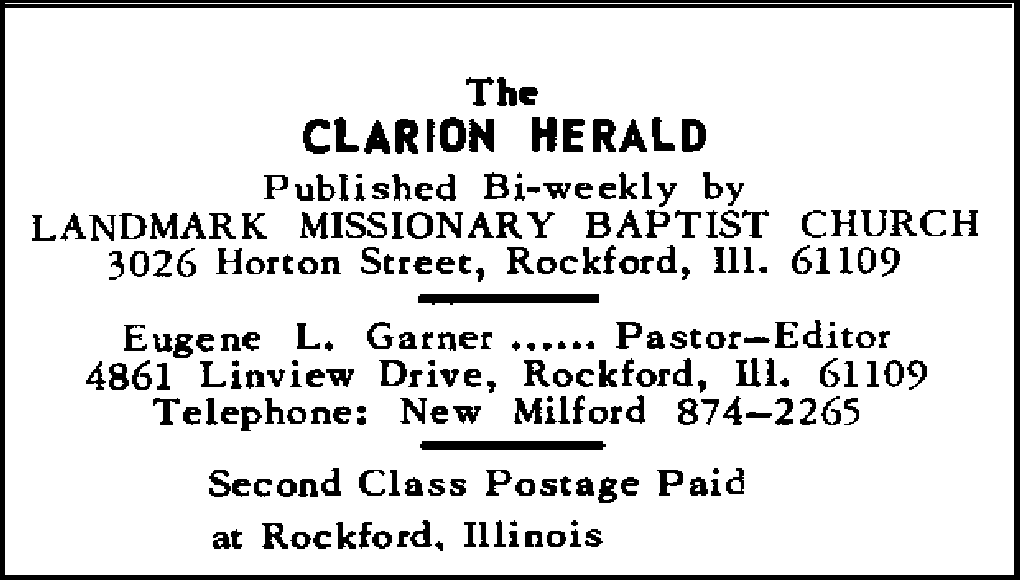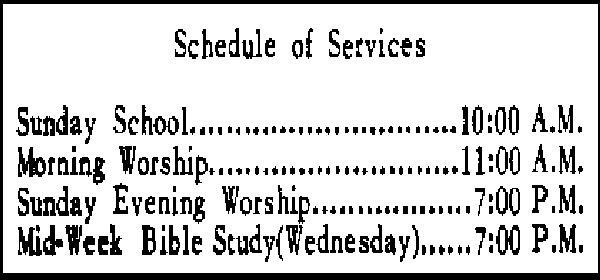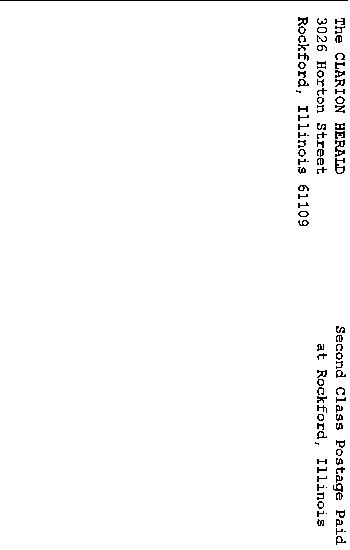
|
 |
 |
 |
|
 
|
|
|
CHRIST, OUR RIGHTEOUSNESS
To one who has come to know God, through a birth from above, the cross of Christ is far more glorious than any crown or honor that the world may bestow, (Gal. 6:14). So far as one's natural standing before God is concerned: Jew and Gentile, publican and pharisee, the outwardly pious and openly profane all stand on a common level - "condemned already" because they have not entrusted themselves, their lives and destinies, into the capable and loving hands of His dear Son Who died for their redemption, (Jn. 3:16-18, 36). Just as "all have sinned, and come short of the glory of God"; so, "there is none righteous (of himself), no, not one", (Rom. 6:23; 3:10, 19-20). Except they repent and turn to God with their whole hearts ALL WILL ULTIMATELY PERISH! (Lk. 13:3).
But, the one who has truly entrusted himself to God, through Jesus Christ, can boldly and confidently say: "In the Lord have I
righteousness and strength", (Isa. 45:24). He is truly "the Lord, our righteousness", (Jer. 23:6). It is "Christ Jesus himself "who, of God, is made unto us: wisdom, and
Continued on Page 4)
|
|
|
|
CHRIST PRAYS FOR HIS CHURCH
"That they may be one, as thou, Father, art in me, and I in thee, that they may also be one in us; that the world may believe that thou hast sent me", (Jn. 17:21).
For some three and one half years the disciples of Jesus had followed Him as attendants, companions and brethren. They had witnessed His love, holiness, zeal, benevolence and many wonderful works. He had already called them "out from" the world and "unto" Himself - constituting them His church, His body and "little flock" to whom it was the Father's good pleasure to give the kingdom. But, the time had come when He must return to the Father. He had been carefully preparing them to carry on the work that He had begun. Before He left, however, He would pray for them. And no one who truly loves the Lord Jesus can think lightly of His church, or fail to yield himself fully to the order our Lord has established therein.
It is important to note, specifically, what it is that our Lord asks for His people.
He prayed for their peace, love and unity. He prayed fervently for that which cost Him so dearly (even
|
|
|
|
|
Page - 2
the shedding of His precious blood) nor did He pray in vain. Luke relates that in Jerusalem "The host of believers were one in heart and soul; no one claimed his belongings just for himself, but everything was theirs in common. And with great power the apostles bore witness to the resurrection of Jesus Christ the Lord, and grace rested liberally on all of them", (Acts 4:32-33. Berkeley).
To the extent that members of New Testament churches today give attention to the same truth and example as motivated the early church we will possess that same spirit. For, as Christ is One IN and WITH the Father, so He prays that the members of His body (the church) may be perfectly joined together -- with Himself as their living Head, (Eph. 1:22-23). He prays that His people "may be one in us" (the Father and the Son).
As the branch is one with the vine, and dependent on the vine -
|
|
|
|
partaking of the same life-principle and influence; so are we to recognize our utter dependence on Christ, the True Vine, (Jn. 15:1- 14). A primary function of the Spirit's ministry within the church is to bring unity of heart, mind purpose and desire according to the will of Christ. All who are truly members of Christ have repudiated the spirit of independence and publicly renounced any claim upon their own lives - pledging (in baptism) their life-long loyalty and devotion to Him who died that all might live, (Rom. 6:1-13; Gal. 5:24). Apart from a humble spirit NO ONE is truly "baptized" into the body of Christ (I Cor. 12:13), where it is possible to drink of the Holy Spirit's fulness.
Only as His people have, "the mind of Christ" - thinking His thoughts and desiring His glory - will the world ever recognize the reality of His glorious person and believe that the Father has sent Him to be the Savior of all men - "specially of those that believe", (I Tim. 4:10).
So long as the relationship existing between the people of God, in any specific locality, is characterized by warfare, instead of peace; bitterness, instead of love; discord, instead of unity; and selfishness, instead of brotherliness; the glory of the Son of God can never be reflected through them to a perishing world.
0, THAT WE MIGHT EVER BE ONE!
********
"How deep-rooted and wretched the unbelief that is surprised by answered prayer!"
|
|
|
|
|
WATCHFULNESS, IN VIEW OF
CHRIST'S RETURN
Having stressed the unpreparedness of the ante-diluvian world for the coming of the flood, and declared that "as it was" then, "so shall also the coming of the Son of Man be", Jesus exhorted His disciples to watchfulness. "Watch therefore; for ye know not what hour your Lord doth come". He follows this up by showing why watchfulness is so important, (Matt. 24:42-51). The people of God must be disciplined to watchfulness because neglect invites disaster!
Does a thief send a notice of his intentions? Is not the element of surprise one of his basic weapons? Then, it is not wise for one who stores valuables in his house to be careless and leave them unguarded, (Lk. 12:39; I Thes. 5:2; 2 Pet. 3:10-11; Rev. 3:3; 6:15).
The Christian is called to similar diligence in watchfulness, (vs. 44; Matt. 25:13; Phil. 4:5; I Thes. 5:6; Jas. 5:9). But, our watching is not to be characterized by cringing fear or spine-tingling apprehension. Ours is to be a joyful, eager expectancy of the "blessed hope" of our Lord's coming to share His riches and glory -- His very nature and deity -- with His faithful people.
DILIGENCE REQUIRED
Whatever the responsibility our Lord has placed upon us, it becomes us to be diligent. The spirit of procrastination leads to ruin. It is a delusion to imagine that there
|
|
|
|
will be plenty of time in the future--thus, neglecting to do God's work today. Things of eternal significance must never be delayed; no man knows whether, for him, tomorrow will ever come!
Who is a faithful and wise servant - to whom a specific work has been assigned? (vs. 45; comp. Lk. 12:42; Acts 20:28; I Cor. 4:2; I Tim. 1:12; 2 Tim. 2:2; Heb. 3:5). The happy servant is the one whom his coming Lord finds faithfully fulfilling his assigned task, (vs. 46; I Tim. 4:7-8). He will be given a permanent role of authority in the kingdom of God, (vs. 47; Dan. 12:3; Matt. 25:21-23; Lk. 12:37; 22:29-30; Jn. 12:26; 2 Tim. 2:12; I Pet. 5:4; Rev. 3:21; 21:7-8).
An evil servant may be identified by his attitude toward the task committed to him by his Lord. He presumes that there will be sufficient time at a later date, (vs;. 48; Eccl. 8:11; Ezek. 12:21-23; 12:26-28; 2 Pet. 3:3-5). He abuses his fellow-servants. He indu1ges his own carnal lusts to the full.
The presumptuous servant will be surprised by his Lord's sudden appearance -- finding his task neglected and unfulfilled. That wicked servant will be judged severely, (vs. 51). He will be "cut off" from the portion of the blessed. He will be appointed "his portion with the hypocrites". And, for him, there will be "weeping and gnashing of teeth", (Matt. 8:12; 25:30; Luke 13:28).
Rejection, or reward, at the Lord's coming, will be determined by one's attitude toward known duty. In view of our Lord's return,
|
|
|
|
|
no one can be more profitably employed than in simple, loving and faithful devotion to the task before him.
Illustrating a right attitude toward one's divinely-given task, in view of our Lord's return, a negro poet has written the following poem:
"There's a King and Captain high,
And He's coming by and by,
And He'll find me hoeing cotton
when He comes.
You can hear His legions charging
in the regions of the sky,
And He'll find me hoeing cotton
when He comes.
There's a man they thrust aside,
Who was tortured till He died,
And He'll find me hoeing cotton
|
|
|
|
when He comes.
He was hated and rejected,
He was scorned and crucified,
And He'll find me hoeing cotton
when He comes.
When He comes! When He comes!
He'll be crowned by saints and
angels when He comes.
They'll be shouting out Hosannah!
to the man that men denied,
And I'll kneel among my cotton
when He comes!!
CHRIST ..... Continued
righteousness, and sanctification, and redemption: That, according as it is written, HE THAT GLORIETH, LET HIM GLORY IN THE LORD", (I Cor. 1:30-31). No wonder Paul protested: "But God forbid that I should glory save in the cross of our Lord Jesus Christ!", (Gal. 6:14). No wonder he so emphatically stated his confidence in the Gospel, (Rom. 1:16). And, no wonder he urged others to follow his example, (I Tim. 1:12-16; 2 Tim. 1:8-14).
Paul well knew that the strength to triumph in life was not his own - it was "all of grace", (Eph. 2:8-10; Titus 3:4-8). He had utterly renounced his former life - becoming identified with Christ in His death and resurrection. Having died to self, the very life of Christ had become resident within him. Thus, He could confidently affirm: "Christ liveth in me and the life which I now live in the flesh I live by the faith of the son of God who loved me and gave himself for me", (Gal. 2:20). No wonder he could say: "FOR TO ME, TO LIVE IS CHRIST!" Christ was His ALL!!
|
|
|
|
|
 |
 |
 |
|




